Key takeaways:
- Compassion in ethics involves recognizing humanity in others and taking action that aligns with our values.
- Pro-life advocacy emphasizes the importance of creating supportive environments for families facing difficult circumstances.
- Building a compassionate community requires small acts of kindness and open conversations about complex issues.
- Personal stories and shared experiences foster deeper connections and understanding among individuals in pro-life advocacy.
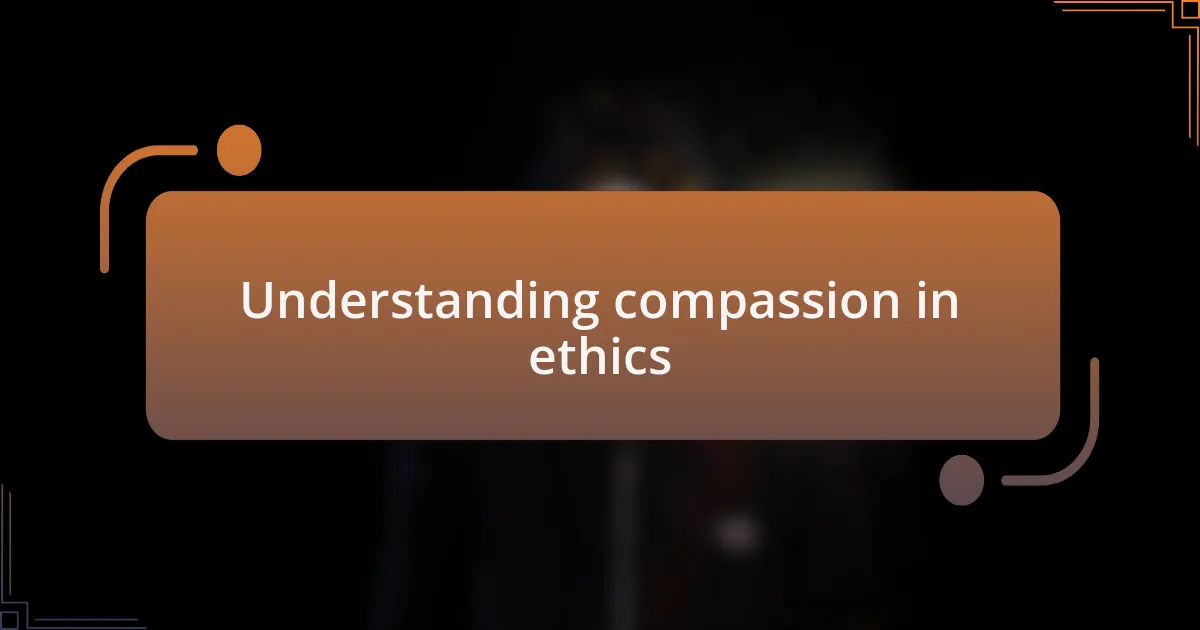
Understanding compassion in ethics
Compassion in ethics centers around the idea of recognizing the humanity in others, even when we grapple with difficult moral choices. I remember a moment when I had to confront an ethical dilemma about supporting a friend who was facing a challenging pregnancy. It made me question: how far does my compassion extend? This experience highlighted that compassion is not just about empathy; it’s about taking action that aligns with our values and the welfare of others.
Consider the ways that our decisions impact those around us. During my volunteer work at a crisis center, I often found that listening was a profound expression of compassion. It made me realize that sometimes, simply being present and understanding someone else’s pain can create a ripple effect that fosters ethical behavior in the community. This leads me to wonder: how often do we pause to genuinely consider the feelings of those we encounter in our daily lives?
In navigating ethical frameworks, compassion often underpins our understanding of right and wrong. I recall a heated discussion with colleagues about the importance of supporting families in crisis. It struck me how often our ethical viewpoints could shift with a personal connection to the issue. Isn’t it fascinating how compassion blurs the lines of rigid ethical theories and reminds us that each choice we make affects real lives?
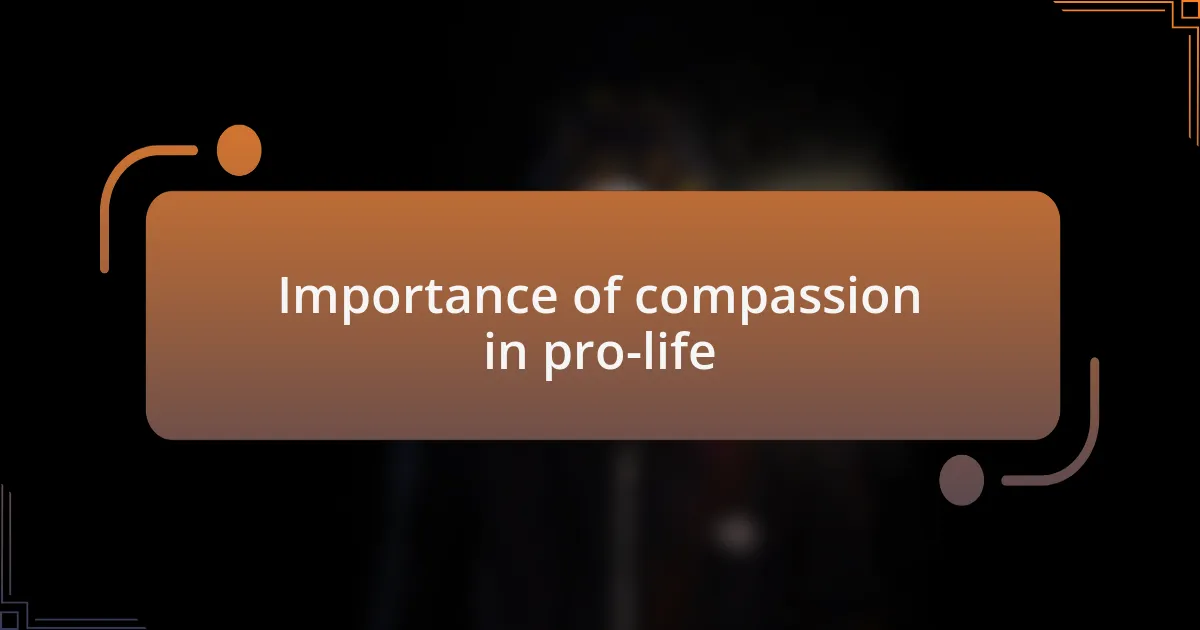
Importance of compassion in pro-life
Compassion plays a vital role in the pro-life movement, as it emphasizes the value of every human life. I remember attending a pro-life rally where I met a young mother who shared her story of feeling abandoned during her pregnancy. Her vulnerability made me reflect on how essential it is to create a supportive environment for expectant parents, showing them that they are not alone. This deep connection underscores how compassion can transform our advocacy into something truly meaningful.
When I think about the importance of compassion in pro-life advocacy, the focus goes beyond just preventing abortion; it’s about fostering a culture of love and support. I once spoke with a woman who had chosen to carry her baby to term despite overwhelming challenges. Her gratitude for those who stood by her during that time reminded me that compassion manifests in tangible support. It made me realize how we can truly influence lives not just through words, but through our actions and unwavering presence in difficult times.
It’s vital for us to remember that every story matters, and compassion enables us to see the humanity within each experience. How often do we reflect on the impact of our words? I recall a moment when a simple act of kindness—a meal shared with a struggling mother—made all the difference in her world. Such gestures remind us that compassion fosters hope, creating a community that uplifts those in need, which is essential in pro-life advocacy.
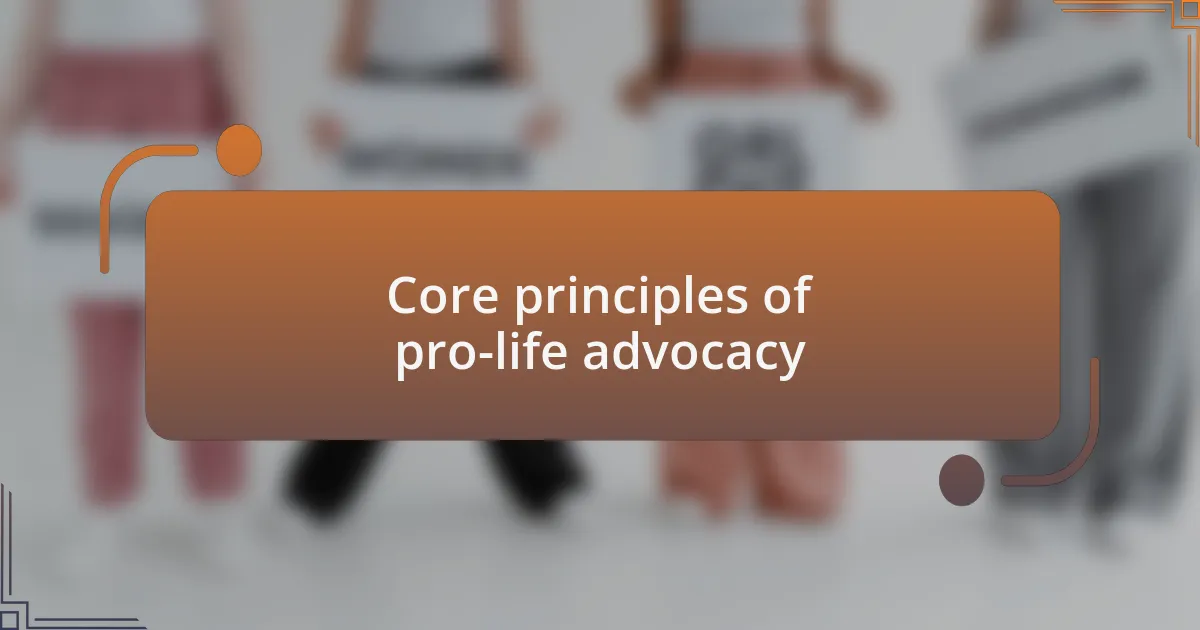
Core principles of pro-life advocacy
The core principles of pro-life advocacy center around the unwavering belief in the inherent dignity of every human life, from conception to natural death. I vividly recall a conversation with a dedicated volunteer at a crisis pregnancy center who described how every appointment is an opportunity to affirm this dignity. It struck me how our role is not only to advocate for the unborn but also to empower parents with the support they need to choose life.
Another key principle is fostering a comprehensive support system for families facing unplanned pregnancies. One poignant moment that stands out for me was when I attended a financial literacy workshop aimed at young mothers. Witnessing their eagerness to learn about budgeting and resources was inspiring. This experience highlighted how essential it is to address both emotional and practical needs, creating a solid foundation for parents as they embark on new journeys.
Finally, advocacy must always be rooted in active listening and empathetic communication. I often reflect on a dialogue I had with a person who held opposing views. By simply listening to their perspective, I was able to identify common ground. This experience reaffirmed my belief that respectful conversations are vital to fostering understanding and compassion within our advocacy. Can we truly claim to represent life without opening our hearts and ears to those we seek to help? In my opinion, it’s this willingness to engage meaningfully that truly defines pro-life advocacy.
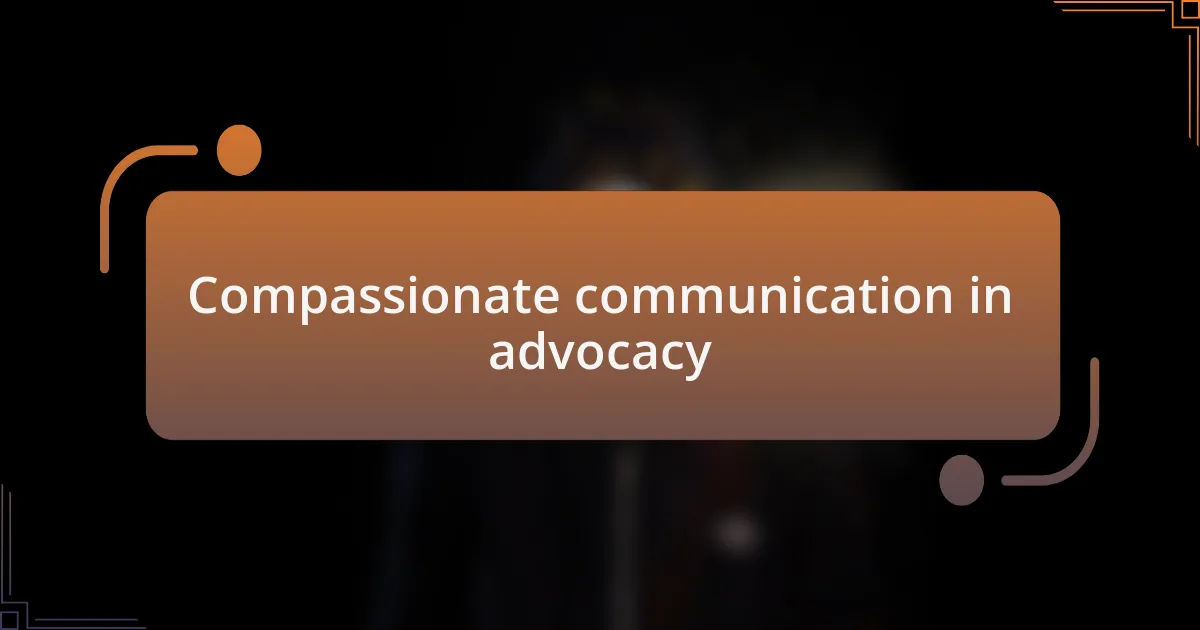
Compassionate communication in advocacy
Compassionate communication in advocacy is paramount in creating genuine connections. I remember attending a town hall meeting where a mother shared her heartbreaking experience with an unplanned pregnancy. The way she articulated her fears and hopes prompted us all to listen intently, reminding me that each story carries profound weight. Isn’t it often our personal experiences that resonate most powerfully with others?
In another instance, I had the chance to participate in a panel discussion on pro-life values. Instead of presenting facts and figures, I chose to share a heartfelt story about a friend who faced extreme pressure to abort. The emotional atmosphere shifted, with many in the audience reflecting on their own journeys. This taught me that compassion isn’t just about what we say—it’s also about how our words can evoke shared humanity and understanding. Wouldn’t you agree that a simple story can sometimes break down the toughest barriers?
Moreover, I’ve found that asking open-ended questions during discussions can transform the dialogue. I recall a conversation with a skeptical student; instead of defending my position, I asked them what they felt was missing in conversations about life. This approach not only fostered a respectful exchange but also deepened my understanding of their perspective. It reinforced the idea that true advocacy thrives on the foundation of empathy and a willingness to learn from one another. What are we, if not human, if we don’t strive for deeper connections?
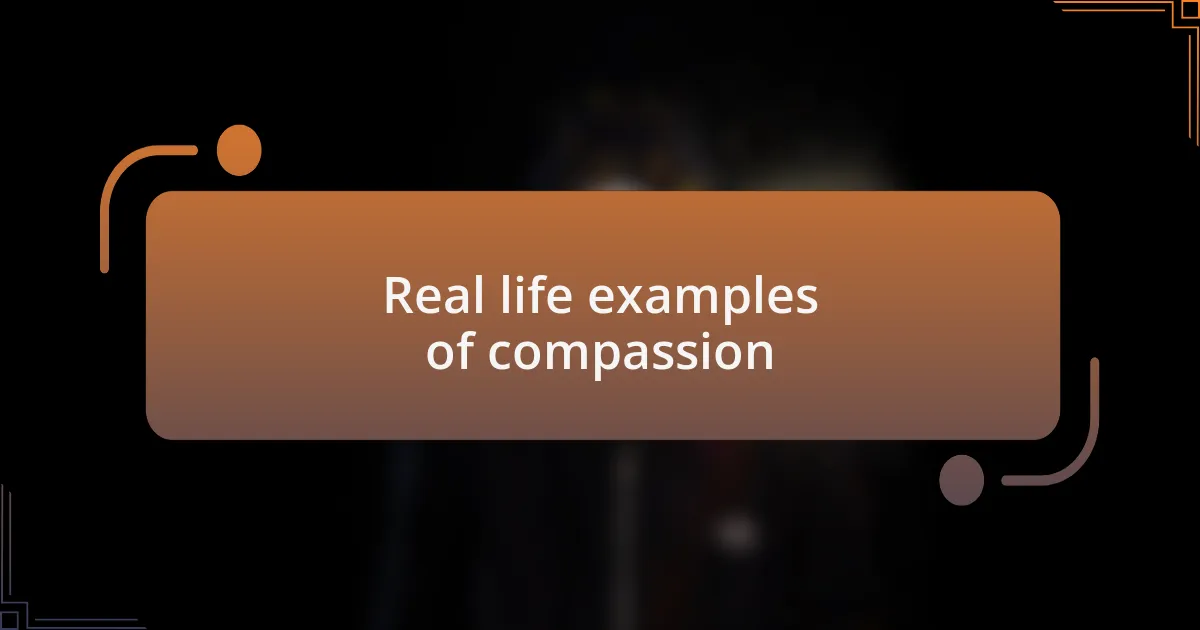
Real life examples of compassion
Compassion often reveals itself in the most unexpected moments. I recall a volunteer experience at a local women’s shelter, where I witnessed a young woman offering her own baby clothes to another mother who was struggling. The smile on that mother’s face lit up the room. It was a small gesture, but it echoed the profound impact of sharing and caring for one another in times of hardship. How often do we underestimate the power of simply extending a hand to someone in need?
Another poignant experience occurred during a community outreach event focused on supporting families in crisis. I met a man who had been a former abortion provider, now advocating for life. His candor about regret and his commitment to help others was moving. He shared how compassion from those he once thought would reject him allowed him to find healing. Isn’t it fascinating how letting go of judgment can foster a path toward redemption, not just for oneself but for others as well?
I’ll never forget a conversation I had with a woman attending a pro-life rally, who shared her story of choosing life despite overwhelming challenges. Her voice trembled as she spoke, yet she exuded such strength and resolve. The crowd around her listened, enraptured by her testimony. It struck me then that real-life examples of compassion are often birthed from vulnerability. Isn’t it incredible how sharing our deepest struggles can inspire strength in others?
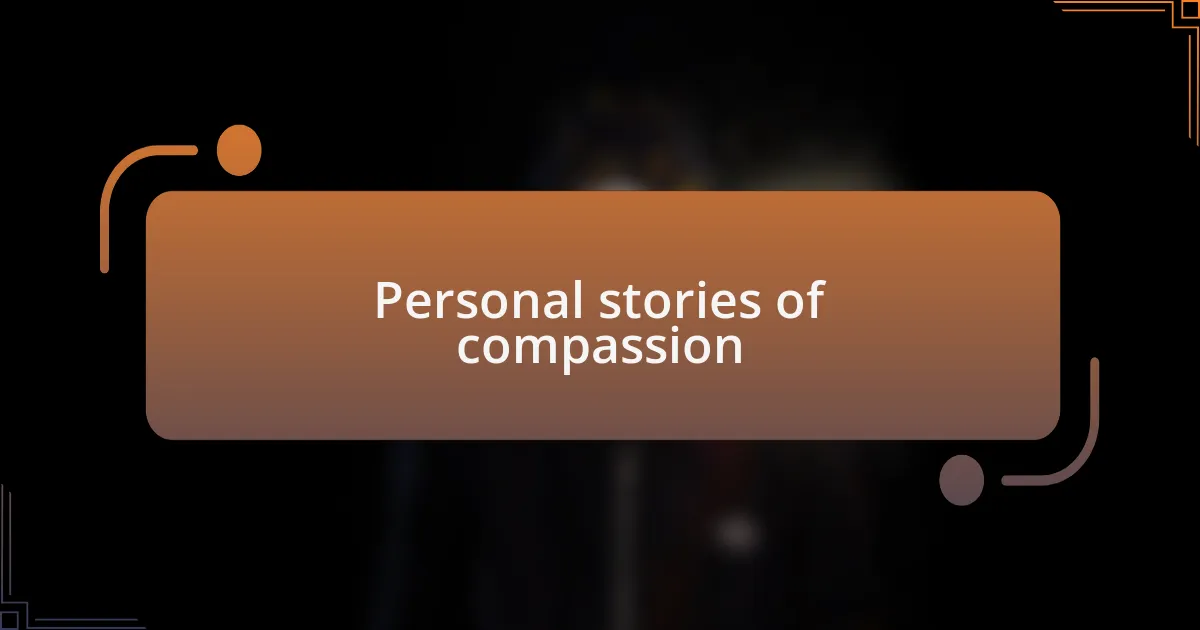
Personal stories of compassion
I remember a time when I volunteered at a pregnancy support center. One particular night, a young woman came in, visibly shaken and uncertain about her future. I took a moment to sit with her, listening intently as she opened up about her fears. In that shared silence, I felt compassion envelop us both. Sometimes, just being present for someone can provide the clarity they need to realize they’re not alone. Doesn’t it remind us all how crucial human connection can be in moments of despair?
Another instance that stands out happened during a fundraising event for expectant mothers in crisis. A former client stepped up to share how the support she received transformed her life. She towards the audience, eyes glistening, and shared that a simple encouragement from a volunteer gave her the strength to choose life for her child. Her story didn’t just inspire me; it reaffirmed my belief that compassion isn’t just about grand gestures. It can be the quiet nudges that paint a brighter outlook in someone’s dark times. Have you ever noticed how uplifting words can spark change?
In a small community gathering, I witnessed a powerful moment when a couple, unable to conceive, offered to adopt the child of a pregnant woman who felt overwhelmed. The selflessness in their actions moved everyone around them. They didn’t just express compassion; they actively became a source of hope for another family. It really made me think about how compassion can manifest in the most surprising ways, doesn’t it? Engaging in someone else’s journey can create a ripple effect of kindness, and we often underestimate the impact we can have on each other’s lives.
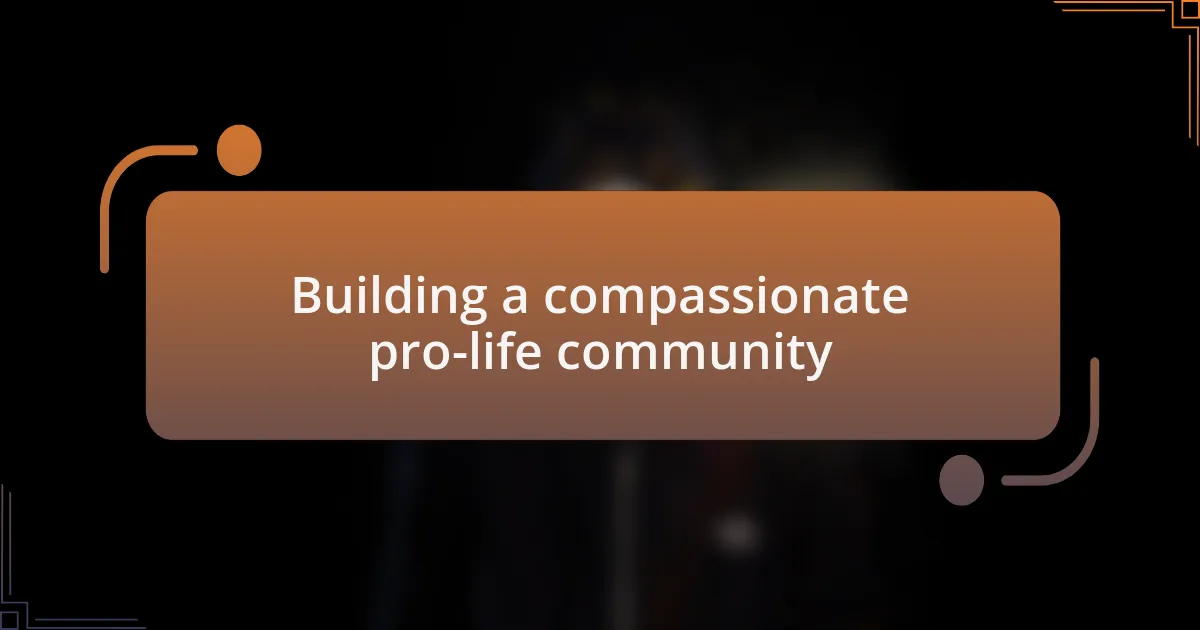
Building a compassionate pro-life community
In my experience, building a compassionate pro-life community starts with small, intentional acts. For example, during a local outreach event, I met a woman who had experienced a miscarriage and felt utterly alone, despite being surrounded by people. Taking the time to sit with her and share my own experience allowed us to connect on a deeper level, reminding me that compassion often begins with shared vulnerability. Have you ever thought about how these moments can create lasting bonds within our community?
I also recall a time when our group organized a baby shower for mothers in need. Each gift wrapped with care came with handwritten notes of encouragement. Seeing the joy on the mothers’ faces gave me a profound sense of purpose. It was a simple gesture, yet it radiated warmth, showing that a compassionate community engages not just with actions, but also with heartfelt intentions. Doesn’t it strike you how meaningful it can be to know someone cares enough to uplift you?
To cultivate compassion effectively, we must encourage open conversations about difficult choices women face. In one discussion, a former abortion clinic worker shared her reasons for leaving that path behind. Listening to her story and her transformation reinforced my belief that genuine empathy involves understanding the complexities of others’ journeys. How can we create safe spaces for these conversations to thrive? By fostering an environment of acceptance and openness, we not only support individuals but also strengthen the very fabric of our pro-life community.